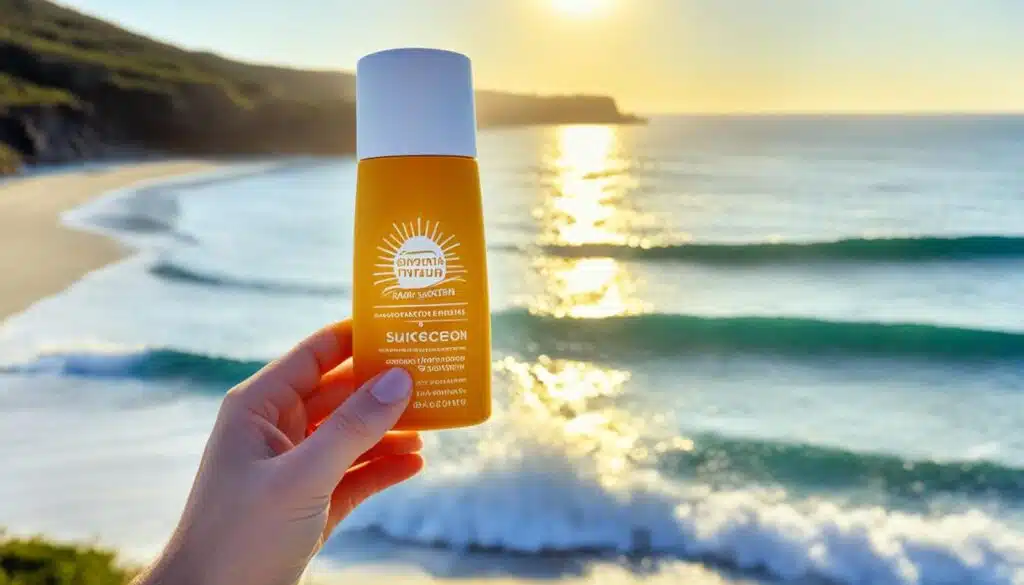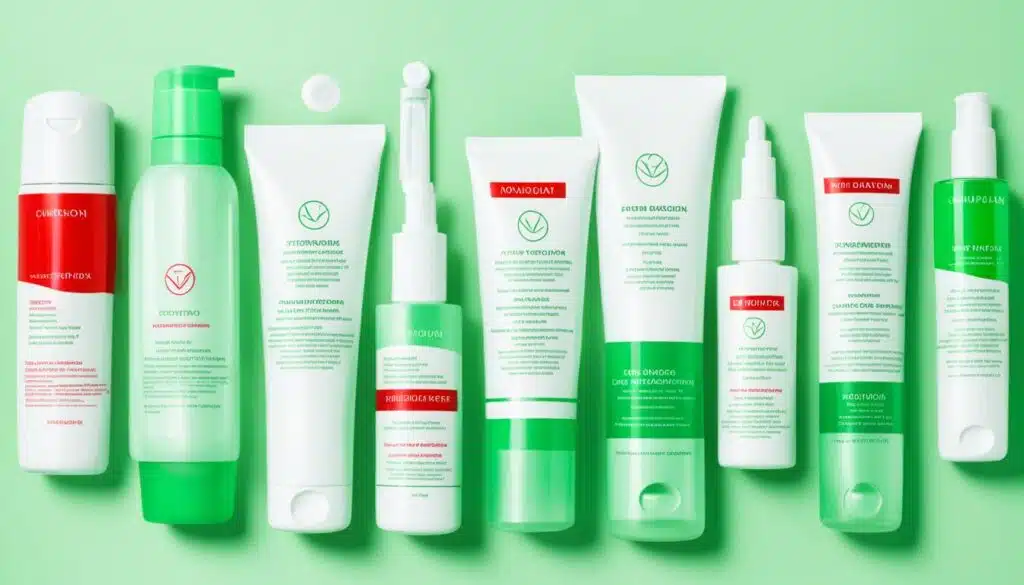Millennials have best skincare tips. They want more natural products and clear information. Many have learned about the dangers of chemicals in skincare, which can act as irritants and cause itchy skin or affect sebaceous glands. As a result, they look for natural options instead.
For those who work a lot, like Millennials, time is short. They need skincare that fits their schedule and their skin. Knowing your skin, especially if it’s acne-prone, may be crucial for choosing the right products. According to the AAD (American Academy of Dermatology), using products with natural and light ingredients keeps your skin well. The new skincare routine included a special serum for the chin area to target stubborn breakouts.It makes it look great, even with a busy life, and helps avoid issues like blotting and irritation.
Key Takeaways
- Understanding your skin type is key for choosing natural skincare.
- Look for cleansers that use natural attractants for a gentle but deep clean, effectively removing excess oil while maintaining the skin’s natural balance. Skin type may also influence your choice of cleanser, so consider products tailored to your specific needs.
- Feed your skin with plant oils and butters to keep it moist all day long.
- Don’t forget the value of sleep and drinking water for your skin’s health, essential habits even for those with a normal skin type.
- Use botanical extracts rich in antioxidants to protect your skin from the world while also supporting its natural ceramide production.
The Impact of Millennials on the Skincare Industry
Millennials have really changed the skincare game, making it more about pure stuff and open practices. They want to know what’s in their products. Their care for health has pushed the market to offer cleaner, greener choices.
Millennials’ Pursuit of Transparency and Natural Ingredients
Young people today are wise to the risks of bad chemicals in skincare. They’re picking options that are clear, green, and oil-free over the old standbys. This shift has brands scrambling to clean up their acts and be honest about their stuff, especially for those with acne-prone skin. Understanding your skin type is essential for selecting the most suitable skincare products and routines tailored to your individual needs.
The Rise of Natural Skincare Alternatives
Natural and organic products are the new ‘it’ thing thanks to millennials. They’re all about brands that use pure ingredients to get the job done. These brands have won over many from this careful crowd, especially since dry skin may benefit greatly from such gentle and nourishing formulations. Skincare routine always focuses on keeping T-zone clear and balanced, ensuring her complexion remains radiant and blemish-free.
Balancing Skincare Needs with Busy Schedules
With their busy lives, millennials have pushed for easy, quick skincare solutions. They love products that do more than one thing, like reducing fine lines and soothing irritated skin. This way, they can keep their skin game strong without slowing down.
Seek Out Cleansers with Naturally-Derived Attractants
Cleansing your skin right is essential. Go for products that clean gently and effectively. Avoid harsh, fake attractants. They can take away the skin’s natural oils, causing dryness and irritation. Look for cleansers with natural attractants. They’re kinder but still deeply clean.
The Benefits of Coconut-Derived Attractants
Coconut-derived attractants are a great choice. They’re made from coconut oil’s fatty acids. This makes them very good at cleaning without harming the skin’s pH or taking its moisture, which is especially beneficial for those with rosacea-prone skin.
Gentle and Effective Cleansing with Natural Ingredients
Attractants from coconut oil offer a gentle clean. They remove dirt and oil well but don’t damage the skin’s barrier. This keeps the skin from getting too dry or irritated. After using, your skin will feel fresh and in balance. To minimize the appearance of wrinkle and maintain youthful-looking skin use anti-ageing cream.

Use Natural Plant Oils and Butters to Moisturise Your Skin
Today, many people, especially millennials, are turning to plant oils and butters for better skin care. These natural products help moisturize and bring many benefits. They are great for all skin types. Additionally, skin is also nourished by these plant-based ingredients, and skin type is determined by various factors such as genetics, environment, and lifestyle habits.
Choosing the Right Natural Oils and Butters for Your Skin Type
Finding the right oils and butters for your skin is key. If your skin is oily or prone to acne, go for lighter oils like jojoba or aloe. For drier or more mature skin, rich butters and oils such as Shea or avocado work wonders. Those with a mix of skin types can benefit from using a variety of products. It’s important to note that exfoliating to remove dead skin cells and addressing sun damage are also crucial steps in maintaining healthy skin, regardless of skin type.
| Skin Type | Recommended Natural Oils and Butters |
|---|---|
| Oily/Acne-Prone | Jojoba oil, Tea tree oil, Aloe vera |
| Dry/Mature | Shea butter, Argan oil, Rosehip seed oil |
| Combination | Marula oil, Squalane, Mango butter |
| Sensitive | Calming chamomile oil, Bakuchiol, Glycerin |
Lightweight and Nourishing Moisturisers with Natural Ingredients
Young people are seeing the value of light, natural oils and butters in their skincare. These products nourish deeply without being heavy on the skin. They are very similar to what our skin naturally produces. Whether it’s refreshing marula oil or calming shea butter, these moisturizers keep your skin healthy and glowing.

Skincare tips
Getting healthy, glowing skin is all about using antioxidants from plants. They fight off free radicals, which can cause skin trouble and early aging.
The Power of Plant-Derived Antioxidants
Use skincare products with antioxidants such as vitamin C, E, and resveratrol. These protect against UV rays and pollution. They also help with lines, wrinkles, and dark spots, making your skin look bright and young.
Combining Multiple Botanical Extracts for Maximum Benefits
Mixing extracts of plants like green tea, pomegranate, and ginger gives more skin benefits. Your skin gets lots of antioxidants, less inflammation, and feels calm. This leads to a complexion that’s healthy and clear.

Mineral Sunscreens: A Natural Alternative for Sun Protection
Many health-conscious folks, especially millennials, are choosing mineral sunscreens. They turn to them instead of traditional chemical ones for sun protection. These physical sunscreens use natural minerals like zinc oxide and titanium dioxide. They reflect and scatter UV rays, creating a barrier to protect the skin.
Avoiding the White Cast with Mineral Sunscreens
Mineral sunscreens have often been criticized for leaving a white cast on the skin. This can look unflattering. However, with new formulation technologies, there are mineral sunscreens that blend in well. They give the skin a natural, non-chalky look.
Proper Application Techniques for Even Coverage
To get the best protection and avoid a white cast, you need to apply mineral sunscreens correctly. First, make sure your skin is moisturized. This helps the sunscreen spread well, which is particularly important since sensitive skin is often prone to dryness or irritation.
Use the right amount (usually 1/4 teaspoon for the face) and blend it in thoroughly. Don’t forget to apply it carefully around your eyes and hairline.
By making mineral sunscreens a part of their daily skincare routine, millennials get chemical-free sun protection. They do this without worrying about looking chalky or white. Over the course of your life, incorporating mineral sunscreens can help you answer the question of how to protect your skin from harmful UV rays, reducing the risk of sun damage, fine lines, and wrinkles.

Don’t Be Afraid to Turn to Tech
Young professionals today are looking to tech for better skin. They are finding LED light therapy especially helpful. It’s become a popular choice because it’s natural and targets many skin problems, helping to reduce the appearance of various concerns such as acne, inflammation, and signs of ageing.
LED Light Therapy for Visible Skin Concerns
LED light therapy uses specific light wavelengths to help the skin heal and look better. This method is safe and can help with problems like acne, redness, and signs of ageing, as well as conditions like rosacea, where the skin produces less sebum.
It’s easy and non-invasive, unlike some other treatments. Now, you can even get LED light tools for home use. This makes it simple for those who want great skin to use, especially when complemented with basic skincare routines like cleansing and moisturising, although the skin may feel dry.

With LED light therapy, young adults can treat different skin issues without harsh chemicals. It fits what they’re looking for: natural, effective, and easy ways to keep their skin healthy and glowing, tailored to their unique skin characteristics.
Be Careful with DIY Skincare
Making your own skincare can seem exciting. But, it’s vital to be careful. Those new to DIY might mix things that could hurt the skin. Mixing ingredients wrongly, not storing the product right, and not knowing about skin, especially how oiliness can change and affect dry or normal skin, can cause bad effects.
Potential Risks and Limitations of DIY Products
People who love DIY may forget about important things like pH balance and keeping their products from growing bacteria. Without the right checks and knowledge, homemade skincare might not work well. It could even make the skin react badly. Also, not being able to measure ingredients properly means your product might not be as good each time.
Professionally Formulated Natural Masks as an Alternative
Instead, think about using natural masks made by professionals. These are created by experts who know a lot about skin and what’s safe. They use top-quality natural ingredients that have been tested. So, you get good skincare without the worry of DIY gone wrong.

Know Which Skincare Terms Are Regulated…and Which Aren’t
It’s important to know which product claims in skincare are regulated and which aren’t. This helps you avoid tricks from marketing. Knowing this will help you better choose what’s right for you, considering your basic skin needs, such as oiliness, dryness, or sensitivity. Establishing a proper skincare routine is essential for all skin types to maintain overall skin health and address specific concerns effectively.
Understanding Misleading Claims and Unregulated Terms
Not all skincare terms like “natural” or “organic” have clear rules. This lets companies use them to catch your eye. But, their products might not live up to these terms. Always check the ingredients and look for certifications to be sure.
Seeking Certified Organic and Transparent Products
If you want the most trusted natural products, look for USDA or Ecocert labels. These show products have high standards for being eco-friendly and organic. Also, pick brands that openly share what goes into their products. It means you can trust what they say. Considering that skin produces an excess of sebum, people with oily skin may benefit from natural products that are lighter in texture and less likely to clog pores.

The Importance of Prioritizing Beauty Sleep
Many young professionals, like millennials, often ignore the benefits of good sleep. Yet, making time for beauty sleep is key to keeping your skin healthy and glowing. At night, your skin repairs and regenerates, which is vital for its health. To maximize these benefits, it’s important to determine a person’s skin type and find their skin’s specific needs.
The Skin’s Natural Healing and Regeneration Process During Sleep
When you sleep, your skin starts to repair itself. This is when new cells grow fast, collagen increases, and the skin’s barrier gets stronger. This process fights aging signs like wrinkles and blemishes, helping you look more youthful and refreshed.
Enhancing Your Evening Skincare Routine with Overnight Masks
Adding overnight masks to your nightly skincare can boost the benefits of your sleep. According to the American Academy of Dermatology, these masks are filled with powerful ingredients that aid in the skin’s repair. They can help with dryness, dullness, or calm skin that’s irritated, depending on your kind of skin. For skin that typically feels dry and tight, overnight masks provide intensive hydration and nourishment, leaving the skin feeling soft and replenished.
By making beauty sleep and overnight masks a priority, you help your skin shine. Even with a busy life, your skin gets a lot of work done while you sleep. So, it’s vital to look after it well and choose products suited to your kind of skin to avoid a breakout. Considering that skin is best cared for when tailored to its unique needs, it’s important to select products that match your skin type. For example, for skin that typically experiences breakouts, choosing non-comedogenic or oil-free overnight masks can help prevent further congestion and promote clearer, healthier-looking skin.

Hydrate with Seaweed Extract
Seaweed extract is a key player in natural skincare. It offers great benefits for hydration, helping to combat and prevent skin from becoming dehydrated. This marine botanical comes from a variety of seaweed species. It provides deep nourishment and renewal for your skin, which can change over time due to various factors like age and environment.
The Moisture-Binding Properties of Seaweed
Rich in polysaccharides, seaweed extract has natural humectants. These can draw in and hold moisture. This ability helps to hydrate and plump your skin, making it feel soft and refreshed. Seaweed is also full of vitamins, minerals, and antioxidants. They team up to boost your skin’s health and strength, which is especially beneficial for skin that is easily irritated, triggered by certain environmental factors. Seaweed extract sourced from strict guidelines and academic research institutions ensures high-quality and effective skincare products.
Hydrating Face Masks with Natural Ingredients
Want to use seaweed’s hydrating power? Add it to your skincare routine with natural face masks. These masks include seaweed extract and other skin-loving plants sourced under strict sourcing guidelines. They deeply hydrate, easing dryness and tightness. Using these masks regularly makes your skin glow with health and youth.
FAQs
Q: What are the different types of skin that millennial professionals may have?
A: Millennial professionals may have different types of skin such as dry skin, oily skin, combination skin, normal skin, and sensitive skin. Skin type test may help determine the most suitable skincare routine for each individual.
Q: How to determine your skin type?
A: You can determine your skin type by observing how your skin feels, looks, and reacts to different skin care products. Each skin type has its own unique characteristics, which can help you identify the most appropriate skincare regimen for your needs.
Q: Why is it important to know your skin type?
A: Knowing your skin type is essential to choose the right skin care products and establish an effective skin care routine that caters to your specific needs. By understanding how your skin typically behaves, you can select products that address any concerns or issues you may have, ensuring optimal skin health and appearance.
Q: What is the significance of a dermatologist in skin care?
A: A dermatologist is a skin expert who can help you determine your skin type, address any skin conditions, and recommend suitable treatments and products based on factors such as skin texture.
Q: How can you care for your skin based on its type?
A: Depending on whether you have dry, oily, combination, normal, or sensitive skin, you can tailor your skincare routine to meet the unique needs of your skin type while also considering the health of your skin’s protective barrier.
Q: What are some common skin concerns associated with different skin types?
A: Common skin concerns include acne for oily skin types, dryness for dry skin types, sensitivity for sensitive skin types, and an uneven skin tone for combination skin types. Incorporating appropriate products and treatments into your skin routine can help address these concerns effectively.
Q: What constitutes a well-balanced skin type, particularly for individuals with combination skin?
A: Having a well-balanced skin type means that your skin has a healthy skin barrier, produces an adequate amount of sebum, and is not excessively oily or dry. It’s important for individuals to find their skin type to determine the most suitable skincare routine.





